Kindly join me in welcoming South Africa to Africa, to become a fully-fledged African country. Thus, let’s declare South Africa an African country. On July 26, 2020, for the first time in the history of the country, South Africa accepted an International Monetary Fund (IMF) loan; this is the day that South Africa decided to follow the path of other African countries, a path that has brought untold hardships to many African countries. The loan amount is US$4.3 billion, and according to the IMF, the loan is an emergency support to South Africa to address the COVID-19 pandemic.
The IMF notes that the loan is needed because the COVID-19 outbreak has led to a sharp economic contraction and significant financing needs in South Africa. It is true that several countries are financially impacted by the pandemic but the issue is whether the pandemic is the only factor that compelled South Africa to seek the loan. The answer is no. Actually, with severe structural constraints to growth, economic activity in South Africa has weakened over the last decade despite a significant government spending. The weakened economic activity has resulted in high unemployment, poverty, and income inequality. Thus before the pandemic, there was a pre-existing situation of structural constraints, subdued growth, and deteriorating social outcomes. In fact, the existing economic hardship was one of the contributing factors that prompted many poor, unemployed and lowly-educated South Africans to attack other Africans living in South Africa.
As expected, the IMF has attached some conditions to the disbursement of the loan. Attaching conditions to loans is normal and rational for lenders to protect their investment. However, we all know that IMF conditions have worsened the economic situations of other African countries that borrowed from the Fund. Fortunately for South Africa, since the goal of the loan is to help the country face the immediate financial consequences of the pandemic, the conditions are not very strict. However, the conditions are strict enough to hurt South Africa just as IMF loans have hurt other African countries.
The main condition is for South Africa to show the IMF that it is facing a crisis, and that it will use the funds to deal with the crisis. Other conditions are that South Africa will cooperate with the IMF to solve the balance of payments problems caused by the crisis and to describe the economic policies that it proposes to follow.
The above conditions are very mild so may not hurt South Africa economically. However, before South Africans jubilate, let’s look at some other conditions attached to the loan.
One, the IMF reserves the right to require South Africa to undertake certain policy actions before it can access the funds. Such an ambiguous condition – South Africa to undertake certain policy actions – is cause for trouble. Since the policy actions are not tabled out, the IMF can demand the unimaginable. We have to remember that the IMF is notorious for imposing policy with little or no consultation with the affected countries.
Two, South Africa has to take certain steps to stabilize the country’s finances. This means the government will cut government spending to reduce its need to borrow. When the IMF demands a government to cut spending, it means certain projects vital to the government and the citizens need to be streamlined. Examples are cuts in public sector wages and funding for state owned enterprises. In the latter case, it may include cuts in funding for schools. In fact, some state-owned enterprises may be sold to private investors.
Three, the government has to introduce reforms to stimulate a growing and inclusive economy. These reforms include measures to improve competition in different sectors of the economy. In a typical African country, this means competition from the international community, a competition that though may lead to better services and competitive prices, may drive indigenous entrepreneurs out of business. Generally, the livelihoods of people in poorer countries have been destroyed by unfair competition from foreign goods and services.
Four, The IMF requires that South Africa repay the funds to the IMF over 20 months beginning 40 months after the loan is disbursed. Forty months is only three years, four months. A question is, what happens if the pandemic lasts very long? Thus, what happens if the crisis remains longer and South Africa needs to spend more money on the pandemic? In that case, how will South Africa raise the funds to pay the debt?
Apart from the treacherous conditions, there are some downsides for South Africa borrowing from the IMF. The most significant downside is that the loan is denominated in foreign exchange. Thus, South Africa has to bear the risk that if the rand depreciates, the loan and the interest on it will become more expensive. Given the state of the South African economy, this is a significant risk. The other risk is that if South Africa does not use the funds from the IMF wisely, the country’s economic situation will deteriorate. Another downsize is the fact that the loan will not generate direct revenue/turnover. If I borrow money to establish a factory, I may generate enough money to repay the loan. On the other hand, if I borrow money to pay my hospital bills, I will not generate any money to repay the loan. This is the situation of South Africa. The loan is to address the COVID-19 pandemic. That means it will not be used for projects that will generate revenue. Thus, the money will be used in an area that will not generate revenue to repay the loan. In that situation, South Africa will struggle to pay back the debt, and eventually fall into the proverbial debt trap. It appears things are falling apart in South Africa. The question is whether the center can hold.
Source: Kwaku Obosu-Mensah
 Home Of Ghana News Ghana News, Entertainment And More
Home Of Ghana News Ghana News, Entertainment And More





